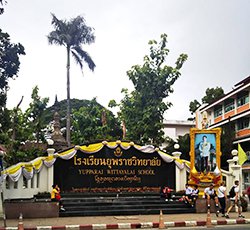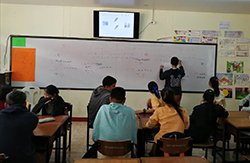Forging and Strengthening Ties
The Japan Foundation, Bangkok (secondary educational institutions in Northern Thailand)
TSUZAKI Chihiro
Sawadee Jao, everyone! (Sawadee Jao means “Hello!” in the Northern Thai language).
Approximately one year has passed since I was dispatched to Chiang Mai, which is located around 700 kilometers north of Bangkok, Thailand’s capital city, or around one hour by plane. I am dispatched at Yupparaj Wittayalai School (hereinafter “Yupparaj School”) here in Chiang Mai, and work as a Japanese-Language Specialist (hereinafter “Specialist”) overseeing secondary education in Northern Thailand (hereinafter “the North”). In this report, I would like to introduce the main duties I am working on as a Specialist.
1. Supporting the School Where I am Dispatched
Yupparaj School, where I am dispatched, is in central Chiang Mai within the old town area, which is surrounded by a moat and castle walls. My counterparts (hereinafter “CPs”) at Yupparaj School are five reliable and deeply-experienced Thai Japanese-language teachers who run their classes inventively on a day-to-day basis.
Yupparaj School is a center school*1, meaning it performs a leadership role in Japanese-language secondary education in the Northern Thailand. As a center school, each year it holds a Japanese-language contest, Japanese-language camp and other events. One of the main duties of a Specialist at Yupparaj School is to support these center school duties. In particular, in the Japanese-language contest, in addition to preparing problems for the dictation competition and recitation competition, I undertake pre-event preparations in partnership with my CPs. Those preparations include asking staff at a neighboring university to serve as judges. Furthermore, on the day of the contest, I support the opening and closing ceremonies and the work of the judges.

Yupparaj School, where I am dispatched
2. School Visits
Specialists in charge of Northern Thailand oversee Japanese-language educational support in Northern Thailand’s 17 provinces while dispatched at Yupparaj School. To the best of my knowledge, Japanese-language education is taking place at more than 90 secondary educational institutions in Northern Thailand. Visiting these schools that are providing Japanese-language education is also one of a Specialist’s key roles.
During school visits, I get teachers to let me observe their Japanese-language classes and provide them with feedback after each class. And together with the teachers, I consider Japanese-language classes that might be better suited to the respective educational institutions and provide advice. Additionally, I believe one aspect of observing classes is to secure a grasp of how teachers who have participated in the range of training held at The Japan Foundation, Bangkok are actually applying in their classes what they have learned in that training.
During school visits, on top of observing classes, I also exchange information with teachers. I get them to tell me about Japanese-language education trends in each school or region, which allows me to get an idea of what sort of information and support is needed. In particular, at schools in towns away from the provincial centers, some teachers work hard alone with less information and with no colleagues in the vicinity to consult. Time permitting, I want to visit as many schools as possible and strengthen networks so the support that is needed can be provided.

A class in secondary educational institutions
3. Regional Teacher Training Program in Northern Thailand
There are a large number of individuals involved in Japanese-language education in Northern Thailand. In addition to of course Thai teachers, there are also native Japanese teachers, NIHONGO Partners, long-serving Japanese volunteers and so on. One of the tasks that Specialists perform is teacher training, but where the teacher training that I offer in Northern Thailand is concerned, I design the training not just for the purpose of improving the quality and abilities of the Thai teachers, but also to create opportunities where individuals from a variety of backgrounds can learn together, and to strengthen the network of people involved in Japanese-language education through collaborative work.
In January 2020, I carried out teacher training program on the theme of “Considering the society that students will be living in 15 years later: What is the Japanese-language education that is needed for the future?” 23 people from diverse backgrounds took part in the training – in addition to Thai and Japanese teachers who teach Japanese language at secondary educational institutions, it attracted teachers who teach Japanese at university, Japanese volunteers, and teachers who teach Japanese at primary educational institutions. During the training, the teachers considered the role of Japanese-language education and the role of teachers, based on a prediction of the society students will find themselves working in as working adults 15 years later. They then looked back on their day-to-day practices on that basis. Participants said the teacher training was “an opportunity to look back on my current practices from a standpoint I am not normally aware of,” and that “As a result of the presence of participants from diverse backgrounds, I was exposed to ideas that differ to my own, which deepened my ideas.”
Additionally, it appears that connections were also formed during the teacher training, with other participants going to the schools of teachers which they were grouped with to provide support. Accompanying the global spread of COVID-19 cases in fiscal 2020, the opening of the new school term at Thai secondary educational institutions was also changed to July. (Normally the new school term begins in May). The pandemic is also affecting schools in other ways, including some classes being held remotely. Specialists’ duties also have to change according to what the circumstances require, but regardless of the circumstances I intend to make every effort for Japanese-language education in Northern Thailand.
*1 Thailand’s Ministry of Education combines neighboring provinces together as single education zones, and establishes “center schools” for each zone. The center schools perform a core role in each zone’s Japanese-language education.
- What We Do Top
- Arts and Cultural Exchange [Culture]
- Japanese-Language Education Overseas [Language]
- Japanese-Language Education Overseas [Language] Top
- Learn Japanese-language
- Teach Japanese-language
- Take Japanese-Language Test
- Know about Japanese-language education abroad
- The Japanese-Language Institute, Urawa
- The Japanese-Language Institute, Kansai
- Japanese-Language Programs for Foreign Specified Skilled Worker Candidates
- Japanese Language Education for Japanese Children Resident Overseas and for the Descendants of Migrants
- Archives
- Japanese Studies and Global Partnerships [Dialogue]
- JF digital collection
- Other Programs / Programs to Commemorate Exchange Year
- Awards and Prizes
- Publications
